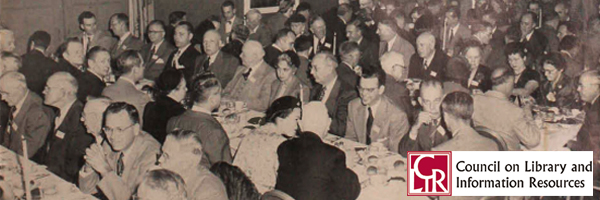
Cultural insight emerges from the NC Baptist Historical Collection housed within ZSR’s Special Collections and Archives, particularly from over a thousand reel-to-reel audio recordings from the middle 20th century that are currently available online within the Baptist State Convention of NC Digital Collection. Approximately 1,100 recordings captured during a span of a half century – saved and donated by the NC Baptist State Convention and supported in this project by a Recordings at Risk grant from the Council on Library and Information Resources (CLIR), made possible by funding from the Andrew W. Mellon Foundation – are a treasure trove for present and future Baptists to hear and learn from their past, as well as other listeners to witness rapidly developing culture in the last century.
As a Baptist, I learned much after being hired to update the descriptive metadata from these tapes–spending early morning hours listening to Baptist speakers. As I listened and documented the creators and their messages along with other technicalities, I realized the value of getting to hear people’s heartfelt concerns in their own words, with every inflection in their tone. Men and women were fighting for the soul of their church and community, and it could be heard in their voices.
The timely intersection of emerging technology that recorded sound, and the growing influence of the State Baptist Convention of North Carolina, created a new dynamic in church history. It allows the listener to eavesdrop on significant theological discussions and business meetings as well as powerful, influential sermons from the likes of Billy Graham. Recordings that span from 1938 to 1980 captured the vibrancy of shifting ground in a range of persuasive voices. The tapes include everything from lessons on telephone etiquette to revolutionary contemporary music beats to the only known recordings of the voice of late 19th century theologians (who had trained the next generation of pastors). They echo the challenges and stories of the evangelical movement in transition. Even the transition of Wake Forest College, originally a Baptist school, to Winston Salem and into a world class institution is found in these recordings, in the highly debated but measured steps that insured its survival.
Sound, captured for the first time in history, preserved not only the passion of the Convention’s preachers, but even the thump of the gavel during heated debates over church autonomy, baptism by immersion, racism and allowing dances on Baptist college campuses, are among many other topics. Not content to merely conduct business in their annual convention meetings, the Baptists of North Carolina, within the larger Southern Baptist Convention, were informed and inspired by preachers using the ancient words of Scripture to do better, in order to be relevant to a vastly different world than their forefathers knew.
While the State Baptist Convention was never primarily political, some years such as the bicentennial year of 1776 saw a Southern Baptist Sunday School teacher elected president and stimulated reflection on a larger role in their communities. While strongly traditional and conservative, they entertained and struggled with new ideas, especially when it came to evangelizing through missions and keeping their youth in the fold. You can hear the winds of change in their voices—captured by a man at the back of the room, quietly mastering a new recording machine and, in doing so, preserving history.
History Altering But Also Evolving Technology
The medium of tape recording in its infancy revealed problems such as gaps in the recordings, volume variations (as enthusiastic preachers forgot they needed to stay close to the microphone) and shrill mechanical sounds. It was a common practice to reuse tapes by recording over them, leaving more than a few sermons with the Hallelujah Chorus at the end from a previously recorded rendition of Handel’s Messiah, by the Wake Forest College Choir. This new device had its intricacies and quirks, much like the people it recorded.
Not always dated on the original reel-to-reel versions donated, cataloguing presented challenges. Listening for references to historical events (never the main thrust of the meetings but mentions of praying for the country during times of war or the recent assassination of President Kennedy) allowed me to estimate a date (or at least a “circa”) in the spreadsheet. The events were mostly annual convention meetings with the occasional special conference for Evangelism or other gathering but the quality or even survival of some years appears random, with significant gaps.
The information this metadata provides will serve many patrons and purposes – assist researchers in Historical Theology writings, allow powerful voices to be heard again (seeming to literally fulfill the Biblical words in Hebrews 11 that “He being dead yet speaketh”) and give context to the Ecumenical Movement that drifted down into the small towns of North Carolina culture through its church pulpits. North Carolina in the 20th century can be better understood because these recordings were preserved and now digitized and catalogued in the Special Collections in the Z. Smith Reynolds Library at Wake Forest University. The past has spoken and can be heard here.

7 Comments on ‘Baptist Echoes From the Past’
You have done terrific work Marcia. This will be invaluable in the future to researchers and interested individuals as well. Thank you for your listening!
Thanks, Marcia! Your description efforts and Baptist historical knowledge will provide excellent access to these tapes!
The attention to detail in your descriptions really stands out and reflects your dedication on this project. Thank you for all of your hard work on this!
Thank you for all your work, Marcia. This will greatly benefit our students and researchers!
It’s remarkable how suited you are for this work! We appreciate your efforts and expertise!
Thanks for sharing the range of content in this collection and especially for highlighting the challenges of accessing and describing recorded sound content. This is labor-intensive work, but there is something special and unique about experiencing history through recorded sound. Thank you for doing this important work, Marcia!
Congratulations on this important work that historians will value in future research.